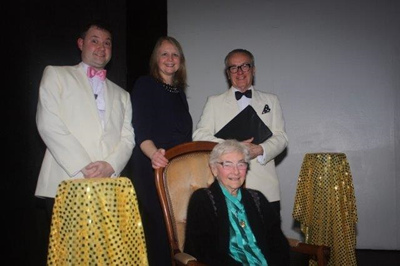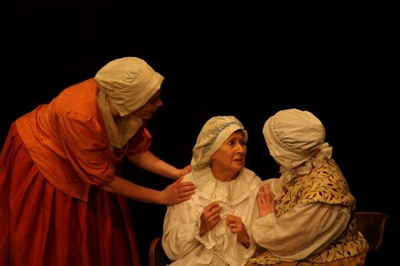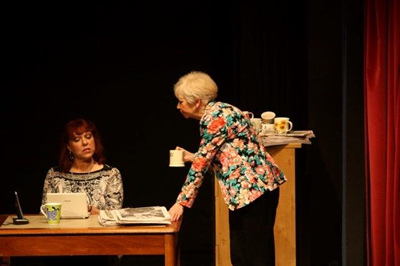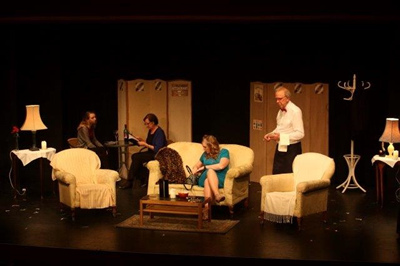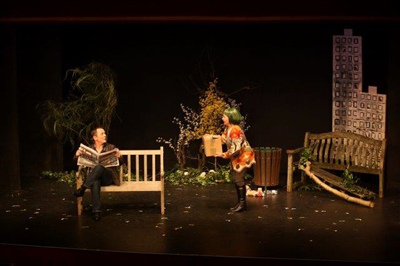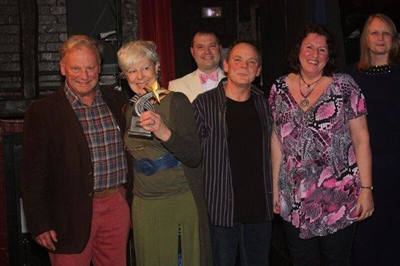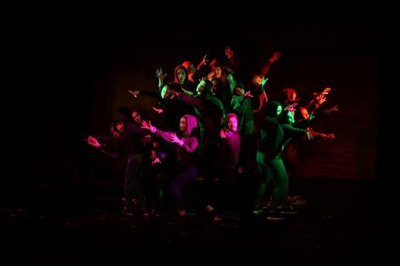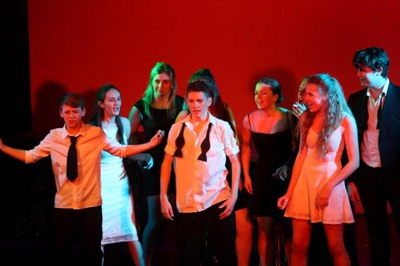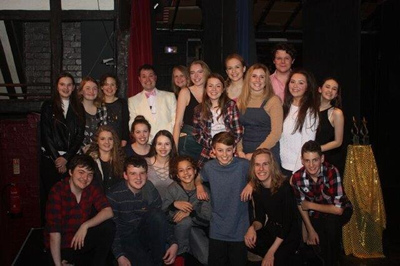
The
Barn Theatre,
25 Bluehouse Lane, Oxted, Surrey
RH8 0AA.
Tel:
01959 561811
Email: barntheatre
@btinternet.com

Southern Counties Drama Festival 2017
Click here to search this site
Peter Calver (Chairman), Maia Oleson (from sponsors ICB Group),
Mike Tilbury (Adjudicator), Jill Perry (Vice-Patron)
20th - 25th February
Peter Calver (Chairman of the SCDF) introduced us to our Adjudicator for the week Mike Tilbury, who was making his first appearance at the Barn as Festival Adjudicator since 2012. With 13 plays, a mixture of adult and youth we were in for an entertaining week.
And so to the first of the plays...:
Monday 20th February
Lights and Bushels - "My Second Best Bed" by Barry SyderThis play is a tour de force for writer, director and stage manager Barry Syder. He is clearly passionate about his subject and he combines myth and fact to give an unusual twist to the relationship between Shakespeare and his family. The play is historically accurate and the drama is brought to life with plausibility and skill. The setting is simple as befits a play that goes on tour. A settle, writing table and chair are the only furniture and mirror the simplicity of houses in the Elizabethan era. The lighting is straightforward and the introductory music sets the atmosphere of Tudor England. The costumes were simple but effective and they enhanced the portrayal of the four characters. Perhaps Judith's dress could have been more flamboyant and Ann's not quite so white - a grey shawl may have toned down the starkness. The curate's and Susanna's costumes were accurate representations for the characters. Susanna played by Kathryn Attwood and Judith played by Emily Hale were believable as sisters and played out the sibling rivalry and banter successfully. They provided a loving and warm portrayal of family life in the Shakespeare household. This was particularly noticeable in the anecdotes about their father and the tenderness displayed towards their mother at the end of the play. Gill Sutton as Anne had a small but endearing role and conveyed the bewilderment of dementia very poignantly. Tom Hounsham as the star struck curate was a convincing foil for the three women. All the actors were persuasive. They had good voice projection and range but perhaps there could have been more variety of pace within the dialogue. This was an interesting and novel play created with warmth and passion. As an opener for the festival it set the bar high and promises great things for this new and exciting company.
Kathryn Attwood was nominated by the adjudicator for Best Adult Actress.
Oast Theatre, Tonbridge - "The Donor" by Branko Ruzic
This two-hander play gave the audience plenty to think about. It was packed full of war torn memories and on occasion went into overload. Although well written and full of historical accuracies, the author Branko Ruzic bombarded the audience with graphic images of the ethnic cleansing which was such an unsavoury aspect of the Bosnian war. The raison d'Ítre of the two characters was a little contrived, which initially distracted from the intense and moving dialogue. Karen Dix as Anna and Steve Hemsley as Andrey gave commendable performances and were a perfect foil for each other. The juxtaposition of characters was highlighted by the black and white of the costumes which emphasised the starkness of the play. Perhaps if Anna had worn a hijab the ethnic dimensions would have been accentuated. The voices of the actors were well matched and clearly heard but more could have been made by using a variety of pace and pause. Anna's voice was on occasion too well modulated and lacked acute fear as she was made to relive her horrendous war time experiences. The exception to this was when she dramatically demonstrated how she attempted to abort her child. Andrey retained a certain dignity and pathos when recalling childhood memories. The direction lacked variety of pace which would have enhanced the barbaric events so poignantly recounted by the two actors. The starkness of the set, the fierce lighting and the electric opening music contributed to the atmosphere. Perhaps more could have been made of the torch during the black out suggesting torture and search-lights. The recorded voices emanating from Anna's head added to the tumult being suffered by the character. As happens so often with festival plays the content was dark and audience had to concentrate. So much was packed into a short time frame but the Oast Theatre lived up to their reputation of producing a very watchable and thought provoking piece of drama.
Karen Dix and Steve Hemsley were both nominated by the adjudicator for the Best Adult Actor / Actress Award.Tuesday 21st February
Oast Theatre, Tonbridge - "A Thing of Beauty" by Charles Kray
This play by Charles Kray takes the form of a forceful philosophical debate in which the audience is fully involved as the actors take on divergent roles. The setting is simple, an altar centre stage with a symbolic cross and candles, a desk and chair for the prioress and a set of 3 chairs to denote a church pew. The lighting, costumes and opening plainchant music set the scene for this well constructed and strong narrative. There were only ever two actors on stage at any one time, which heightened the ambience of debate. All three actors were strongly portrayed. The prioress played by Annie Young evolved from being a well meaning mother of the convent to the anguish of having to denounce and sacrifice one for the lives of many. This was a moving performance played with dignity and pathos. Nick Smith as the Colonel was entirely believable. We saw him first as a bullish Nazi officer but soon realised that he suffered inner heartache and times of self doubt. He had the sympathy of the audience as he wrestled with his inner demons. His was a lengthy part on stage for the whole time but he sustained the role throughout. Elizabeth McCreadie as Sister Benedicta had real stage presence and acted her part with poise and assurance. She was a fitting counterbalance to the Nazi Colonel, the two of them having strong combative dialogue and argument. By its very nature the play is fairly static. The director kept moves to a minimum yet the action flowed seamlessly. All three had worked hard on their characters and created a successful piece of drama.
The adjudicator nominated Nick Smith for Best Adult Actor and Sandra Barfield for Best Director.
Best Actress - Elizabeth McCreadie (Benedicta)Sevenoaks Players - "The Right Honourable Lady" by Francis Beckett
It is not often your reviewer agrees wholeheartedly with the adjudicator but during the performance mostly every word I wrote down was echoed in his comments! 'The Right Honourable Lady', written by the well known political commentator Francis Beckett, is a good choice for festivals but it needs to move at a spanking pace. The delineation of the stage space was good but could have been enhanced by more precise lighting. The director's ploy of keeping all actors on stage throughout added an extra dimension to this creditable production. Although all 5 actors were believable, each could have put more energy into their roles and finely tuned the character studies. The journalist Flavia played by Joanna Othwick needed to have a ruthless streak of determination as she scaled her career ladder. Lynn Short as the Secretary of State could have made more of her professional persona, especially when creating the imagined parliamentary speech. There needed to be more electricity between Nicola and her lover Stephen. Their relationship was not all together believable. Robbie Rickard as Stephen played the failed academic competently. His final speech at the end of the play demonstrated great pathos. Barbara Smith as the editor Miranda certainly looked the part but she needed to show more aggression, scheming and ruthlessness. Ian Tucker-Bell played the Chief Whip, Griff with an understanding of political machinations. This was an easy play to watch. The author clearly knows his subject and this authenticity shone through giving the audience well balanced entertainment.
Wednesday 22nd February
Alternate Shadows - "White Lies" by Richard James
This is a play where women of a certain age will recognise themselves. Four alumni reminisce and bring each other up to date with their lives. The scene is set in the foyer of a hotel but unfortunately the furniture made it look more like a private sitting room which initially confused the audience. When a three piece suite is set in the centre of the stage it inhibits movement upstage and the coffee table was a further barrier to the action. Fortunately most of the activity was sedentary and merely involved the actors swapping seats. Each of the four women established their characters and the differences between them provided the story line. Denise Wilton as the avaricious bitchy Bea created a persona which set her apart from the others. Her costume and jewellery accentuated the difference. Karen Williams portrayed the homeliness and sensitivity of Ruth who as the disillusioned 'earth mother' was devoted to her husband and son. Sophia Harding convincingly understated the lovelorn yet successful playwright Judith. Although the part of Pam was a smaller role, Elaine Laight quickly established the easy going ebullient fraudster. The characters of the women were further enhanced by their costumes which identified their diverse personalities. Mick Harris had a difficult role as the waiter and needed to use pauses to highlight his numerous asides. The play relied on words rather than movement. There needed to be more variety of pace and the use of pauses to highlight the humour. This would have given the audience the opportunity to laugh more frequently. Alternate Shadows performed a good ensemble piece but needed to fine tune the delivery.
Woldingham Players - "A Little Box of Oblivion" by Stephen Bean
It is always difficult to set an outdoor scene on stage but Woldingham Players succeeded very well with their somewhat seedy municipal park. From the very start they set a brisk pace with variety of speech, salient pauses and speedy cue biting. The whole play sparkled with energy. Although it is described as 'absurd' the characters and situation are both completely believable. It would have been easy for the actors to become stereotypes but with great sensitivity and detailed characterisation they produced a slick and at times ominous piece of theatre. From the outset Rick Morris established the character of Cool. He had good stage presence and was clearly at ease in the role. He moved well and used his prop of a newspaper very effectively. Cool's laid back attitude was a perfect foil for the others' neurotic behaviour. Sarah Greenwood was convincing as Neuro and grew into her role as the play progressed. Likewise Doom played by Ziggy Szafranski was entirely believable as a doom ridden fantasising abattoir butcher. The amateur detective Dick, acted by David Martin provided the audience with yet another zany but credible character. The cameo role of Woman played by Berry Butler demonstrated the anxiety which set the scene for the rest of the play. Woldingham Players produced a well rehearsed tight performance with plenty of energy speed and attack. It was a joy to watch.
Ziggy Szafranski, Sarah Greenwood and the director Pippa Martin were all nominated for awards.
Best Actor - Rick Morris (Cool)
Best Adult Production
Thursday 23rd February
The Oast Youth Theatre, Tonbridge - "Stolen Secrets" by Fin Kennedy
This play is composed of three fables linked by the common theme of secrets. The author Fin Kennedy originally wrote for a girl's school in Tower Hamlets and he has caught the ambience of the locality. The script is mainly in verse and Oast Youth Theatre successfully captured the rhythm and pace of the narrative. The play is versatile in that it can be performed by an open number of actors and therefore is popular with school drama groups. All seven of the actors were clearly identifiable in both speech and mannerisms. They had researched the characters well, despite this Kent based company having little in common with the mores of London's East End. All the roles were entirely believable and acted with a mature sincerity not often seen in youth theatre. There was clarity of speech and movement although a wider variety of pace would have enhanced some of the scenes. The collaborative team spirit prevailed and this sense of unity lifted the whole production. It is difficult to single out any of the actors for special mention. All were good at defining their individual characters. The set was simple with the effects created by lighting and the use of colourful post-its scattered on the black curtains to frame the action.
Jason Lower was nominated by the adjudicator for Best Director.Heathfield Youth Drama - "The Terrible Fate of Humpty Dumpty" by David Calcutt
A large cast was involved in this production and thanks to the experienced direction of Mary Pearson it ran smoothly and cohesively. The perennial theme of bullying was seen through the eyes of all those involved - the victim, his family and friends, the police, the school, the head-teacher and the intimidating gang. All parts were well cast and well prepared so it is difficult to single out any particular actor for praise. Each cameo role created its own identity and clearly a lot of intense observation work had gone into the various character studies. There was a dedication to detail and a team spirit which highlighted the emotive subject of bullying and demonstrated its far reaching consequences. The simple set consisting of a collection of rostra was appropriate and was used to great effect when Terry, played by Henry Childs, climbed the pylon. His scream and the lightning flashes were a moment of pure drama. The rostra were also used successfully for the crowd grouping when the action was taking place elsewhere. Particularly noticeable was the gang's stillness when the attention moved to other scenes. Well done. This was a long play but the cast maintained concentration throughout and gave the audience a detailed and forceful piece of theatre.
Henry Childs and Seth Atherton were both nominated for the Best Young Actor award and Grace Richardson and Georgia Archer received nominations for Best Young Actress.Friday 24th February
Heathfield Youth Drama - "The Little Nut Tree" by T B Morris
These fledgling young players from Heathfield Youth Drama grappled manfully with this somewhat dated play based on the well known nursery rhyme. Each character was evident in essence but this juvenile cast needed more rehearsal and direction to improve their voice projection and general stage craft. Confidence dipped when prompts were required and the audience could feel the agony as those on stage waited for the next line to be delivered. But these young people soldiered on and demonstrated a tenacity which will ensure they become confident performers in the future. The groupings on stage were somewhat awkward, often with the players standing in straight lines and masking other actors. Greater use could have been made of the whole stage. There needed to be an awareness of the other cast members and more cohesion as a team. Each individual had obviously worked on his or her own role but there lacked interplay between the characters. All too often the actors only really came to life when they were speaking. The set, props and furniture were somewhat sparse but the costumes gave a flavour of Spain.
The Young Oxted Players - "Bully Dancers" by Frank Gibbons
The Young Oxted Players worked cohesively as a team despite the fact they were acting two opposing groups. The interplay between the rivals had energy and the audience could sense the tension between them. These young actors performed with confidence and were clearly at ease with their peers. They worked as a troupe, each depending on and reacting to one another. In so doing they produced a credible and strong piece of drama. Voice projection and stage presence was assured and well managed. There were some good cameo performances and the actors created characters with their own individuality yet managed to demonstrate a group identity for the rival gangs. It is often difficult for young people to play adults but Hayley Sasserath and Teddy Stevenson gave sensitive performances as harassed parents. The girls successfully assumed a variety of persona and Thomas Muscio was a credible Zac. The simple set provided the necessary back drop and managed to create the atmosphere of a rather dingy rehearsal space. The open stage provided enough room for the dance routines and Zac's escape through the window was cleverly masked.
Glow Theatre Group - "Hoodie" by Lindsay Price
This play by Lindsay Price clearly demonstrates teenage angst and confusion. From the very outset there was an infectious energy which transported the older members of the audience back to their younger days of agonising indecision. The crowd scenes were well orchestrated and presented good visual images. The simple costumes of dark coloured hoodies provided a good foil for the imaginative lighting. The tempo of the choral speaking was brisk and upbeat. Every word could be heard. Projection and articulation came across very clearly and there was imaginative interpretation of the script. This production was very tight and controlled, it exuded fast pace and enthusiasm throughout. The individual cameos were acted with sincerity and demonstrated strength of character.
Nominations for Best Young Actor were given to Joshua Millar and Evan Moynihan and Best Young Actress to Carrie Charles, Eloise Smith and Krista Goodwin. Natasha Palmer was nominated for Best Director.
Best Young Actress - Eloise Smith (Natalie)
Best Stage Presentation
Adjudicator's Award
Saturday 25th February
Glow Theatre Group - "Everyman" adapted by Carol Ann Duffy
This modern adaptation by Carol Ann Duffy of a medieval morality play was a brave choice for Glow Theatre Group. The talented and experienced production team put together a compact and highly visible show which kept the audience enthralled throughout. This was a very tight and disciplined production involving both ensemble work and individual vignettes. It attained a very high standard of performance. Simple black cube boxes were moved about the stage to create the different locations. The plastic city and tsunami scenes were cleverly devised. They were imaginative and very effective. The acting was controlled and very powerful. The blend of chorus and actors worked well and the whole company were focused. They all maintained concentration even when they were not participating in the action. It was a true team effort. Young Edward Cowlard as Everyman gave continuity throughout and is to be congratulated on his very long and arduous role. Tom Gardner as Death provided a sinister element and was a menacing presence even when he was not speaking.
Charlotte Bridson received a nomination for Best Young Actress. Nominations for Best Young Actor were Edward Cowlard and Tom Gardner and Matthew Falconer was awarded Best Young Actor. The play was nominated for Best Stage Presentation.
Best Young Actor - Matthew Falconer (Knowledge)
Best Youth Production
Martin Patrick Award for Best Director - Jackie Driscoll
Adjudicator's Award
ICB FESTIVAL WINNERS AWARD
The Oxted Players - "The Twelve Pound Look" by J M Barrie
This somewhat dated play by J M Barrie gave an insight into the social times at the turn of the century and reflects the growing emancipation of women. The set and costumes reflected the era and much attention had been paid to detail. Sir Harry Sims, portrayed by Peter Damesick was an unpleasant chauvinist and completely self centred. He exuded a bombastic air right from the opening of the play and became steadily more unlikable throughout which was exactly right for his character. Catherine Wyncoll as Lady Sims was dutifully subdued and stately looking in her presentation gown. She maintained her dignity and eventually showed her true colours and sparkle in the final lines of the play. Marion Barker as the first wife cum typist gave a spirited performance of a liberated woman. She was clearly a match for her ex husband and ran rings round him intellectually. All three main actors melded their very different characters into a composite play. However there needed to be more variety of pace, quicker cue biting and animation.
Reviews by Tricia Whyte and photos by Mike Sutton

